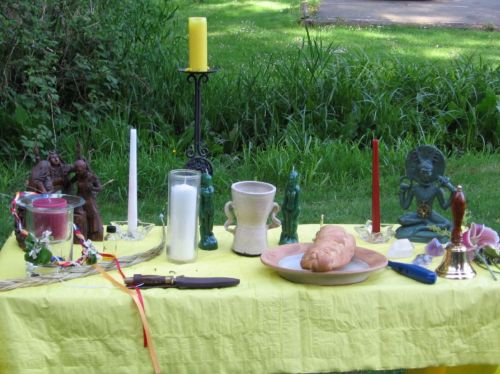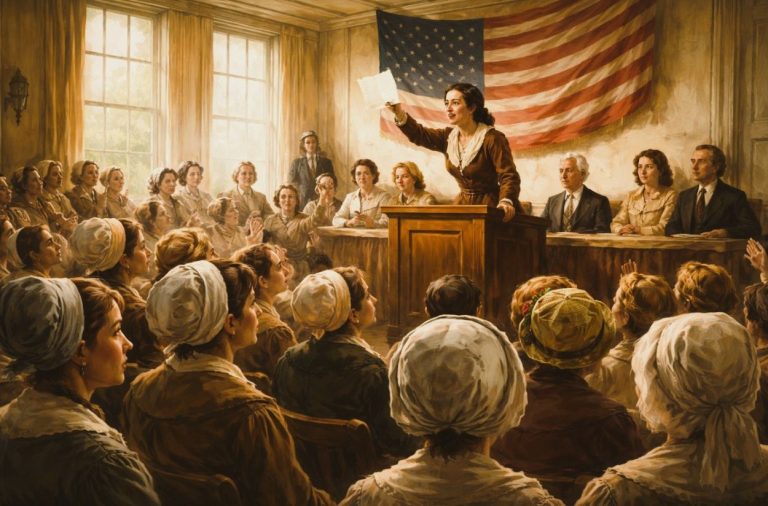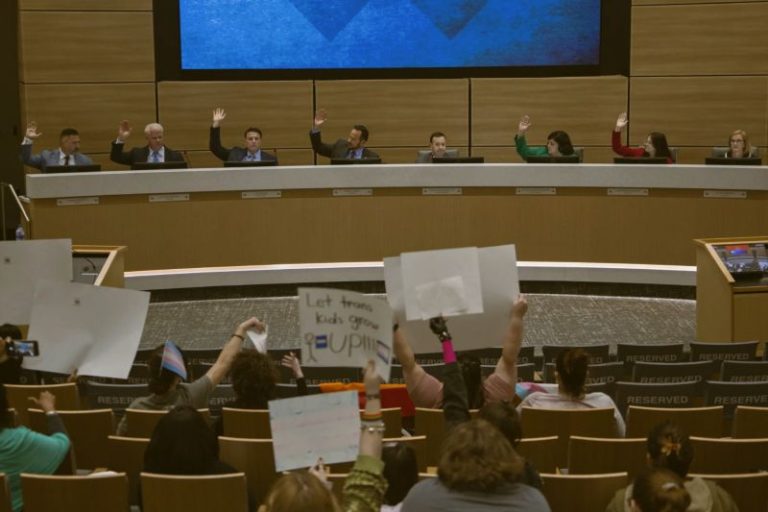

Discrimination against pagans and Wiccans continues to surface in workplaces, community settings, and local institutions.

By Matthew A. McIntosh
Public Historian
Brewminate
Introduction
A recent lawsuit filed in Pennsylvania highlights how discrimination against pagans continues to surface in workplaces across the United States. A Panera Bread employee alleged that managers mocked her pagan practices and disciplined her unfairly because of her beliefs, as detailed in their coverage of the religious discrimination case. The claims reflect a broader pattern documented in other court filings and community reports, where individuals who identify as pagan or Wiccan say they face prejudice, exclusion, or harassment in settings that range from employment to community events.
These concerns extend beyond a single workplace dispute. In West Virginia, a pagan organization was denied participation in a city holiday parade, prompting the group to accuse local officials of discrimination. The incident was covered by the News and Sentinel, which reported that the city accepted religious groups of other traditions while excluding the pagan organization, raising questions about equal access to community spaces.
Recent coverage from The Wild Hunt illustrates how these issues also appear in more rural settings. Their reporting described how a Wiccan covenstead in the Midwest was harassed by a local pastor, who repeatedly targeted the property and attempted to disrupt their gatherings.
These incidents suggest a wider trend of misunderstanding and unequal treatment of minority faiths. While federal law protects religious freedom for all traditions, including pagan and Wiccan practices, these protections do not always translate into fair treatment in public life. Community disputes, workplace cases, and academic research show that bias against pagans remains a recurring issue in the United States, shaped by cultural assumptions and local decision-making. As sections that follow will show, this discrimination has implications not only for the individuals affected but also for broader conversations about religious diversity and equal rights.
Documented Legal and Workplace Discrimination
Legal filings and workplace disputes show how pagans and Wiccans face unequal treatment despite federal protections for religious practice. In Pennsylvania, a Panera Bread employee filed a lawsuit alleging that managers disciplined her more harshly after she identified her faith as pagan. Americans United, which reported on the case, outlined her claims that supervisors ridiculed her beliefs and limited her opportunities in the workplace, as detailed in their coverage. Her case reflects growing concern from civil liberties advocates about how employers handle minority religious identities.
Similar issues appear in other workplaces. The ULC Case Law Blog documented a lawsuit involving a furniture store employee who alleged she was fired because of her Wiccan faith. The suit, described in their legal summary, argued that managers treated her religious practices with hostility and used them as justification for termination. The account shows how misunderstandings about Wicca can influence professional decisions in ways that violate federal law.
Earlier cases demonstrate that this pattern is not new. Reporting from SILive describes a Staten Island lawsuit in which an employee said she was harassed and demoted after identifying her beliefs as Wiccan. She claimed that supervisors made derogatory remarks about her spirituality and retaliated when she attempted to report the behavior. These incidents, separated by years and geography, show how bias against pagan traditions can surface in different types of workplaces.
Together, these legal disputes reveal a recurring problem. Despite laws requiring employers to accommodate religious beliefs, pagans and Wiccans continue to report discrimination tied to assumptions about their practices. The cases documented in these sources show how workplace decisions can be shaped by stereotypes rather than legal standards, creating barriers that minority faiths must work harder to overcome.
Community and Public-Sphere Discrimination
Incidents of discrimination extend beyond workplaces and into community events where pagan groups seek visibility and equal participation. In Parkersburg, West Virginia, a local pagan organization attempted to join the city’s annual holiday parade but was denied entry. Other religious groups were allowed to participate, while the pagan organization was excluded, a decision that raised concerns about equal access to public celebrations. The group’s response and the city’s justification were documented in the newspaper’s coverage, which noted community debate about the decision.
Harassment has also been reported in smaller rural settings. A Wiccan covenstead faced repeated interference from a local pastor who visited their property, confronted members, and attempted to disrupt their gatherings. Members requested assistance from local authorities after the incidents escalated. Their account illustrates the vulnerability of minority religious communities in areas where spiritual diversity is less visible.
These situations show how exclusion and harassment can shape public life for pagans. Denials of participation in civic events limit opportunities for representation, while persistent targeting by individuals or community leaders can create an atmosphere of intimidation. When these incidents occur in publicly funded or widely attended settings, they raise broader questions about whether religious freedom protections are applied consistently across traditions.
Community-level discrimination often has ripple effects. When pagan groups are treated differently in public spaces, it can reinforce misconceptions and encourage further social stigmatization. The patterns documented by these reports demonstrate that discrimination is not confined to private settings but can emerge in local government decisions and neighborhood interactions, affecting how pagans engage with their broader communities.
Academic and Cultural Perspectives on Pagan Discrimination
Longstanding misconceptions about pagan and Wiccan traditions continue to influence how these communities are viewed in public life. Centuries-old stereotypes shaped modern attitudes toward non-Abrahamic religions. Cultural narratives have often framed paganism as deviant or threatening. These historical associations continue to color contemporary interpretations of pagan identity.
Discrimination is often tied to misunderstandings of pagan practices. Many traditions within paganism, including Wicca, emphasize ethical values such as responsibility, environmental stewardship, and personal autonomy. Yet stereotypes rooted in earlier eras lead some people to view these beliefs with suspicion. The persistence of these misconceptions shows how education about minority faiths remains limited, even as public awareness of religious diversity increases.
Contemporary commentary from community members reinforces these concerns. A letter published in The Daily Advance describes personal experiences with anti-pagan bias in everyday life, including social exclusion and derogatory remarks. The writer, speaking as a Wiccan, notes that misunderstandings about rituals and symbolism often lead to negative assumptions. Such firsthand accounts illustrate how discrimination can manifest not only in institutions but also in informal interactions within local communities.
Media outlets also document how cultural narratives can distort perceptions of pagan values. In The North Texas Daily, an opinion writer responded to claims that paganism aligns with extremist ideologies, arguing that such assertions misrepresent the spiritual foundations of the tradition. Pagan beliefs do not support the political ideologies to which they are sometimes unfairly linked. This response highlights how misinformation contributes to stigma.
Cultural misunderstanding is further reinforced by the relative invisibility of pagan communities in mainstream discussions of religious freedom. While high-profile debates often focus on conflicts involving large denominations, pagan groups rarely receive comparable attention. This lack of visibility allows misconceptions to persist and leaves affected individuals with fewer avenues to challenge stereotypes. Academic research and community commentary suggest that this invisibility is itself a form of marginalization.
Discrimination against pagans is rooted in a combination of historical biases, cultural misunderstandings, and contemporary misinformation. Academic analysis provides context for why these misconceptions endure, while personal accounts show how they continue to shape public attitudes. The result is a cultural environment where pagan traditions are often misunderstood or misrepresented, creating barriers to full acceptance and equal treatment.
Political Context and Religious Freedom Debates
Political debates about religious liberty often center on mainstream faiths, leaving minority religions such as paganism and Wicca outside the core of national conversations. When legal protections or policy frameworks emphasize traditional or widely recognized denominations, smaller spiritual communities can be overlooked. Incidents documented in local reporting, including parade denials and workplace disputes, show how uneven enforcement of religious freedom can leave pagans without the same level of institutional support afforded to larger groups.
This dynamic becomes even more concerning when political movements promote frameworks that privilege specific religious identities. Proposals tied to Project 2025 may narrow definitions of religious liberty in ways that reinforce traditional, majoritarian expressions of faith. Such proposals could limit pluralism by elevating one religious tradition within public institutions. Although these ideas do not explicitly target pagans, their potential impact on minority religions is clear.
Local governance decisions provide additional examples of these uneven standards. The parade exclusion reported by the News and Sentinel demonstrated how a city could permit certain religious groups to participate in a public celebration while denying access to a pagan organization. Their coverage shows how city officials justified the decision and how community members responded. These incidents reveal that political or cultural preferences can influence which faith groups are welcomed into civic spaces.
In some cases, political rhetoric contributes to misconceptions about pagan traditions. The opinion essay in The North Texas Daily, which addressed false claims about paganism aligning with extremist ideologies, was written in response to public narratives that framed pagan beliefs inaccurately. The writer argued that such rhetoric distorts the values of pagan communities, as stated in the opinion piece. These claims, even when not rooted in evidence, influence how political conversations treat minority faiths.
The overall effect of these political and public narratives is an uneven application of religious freedom. When laws or policies implicitly prioritize certain faith traditions, minority religions face higher barriers to participation and acceptance. Pagans encounter discrimination not because protections are absent on paper, but because their application in public institutions and local governance often reflects the political and cultural assumptions of the majority.
Why Protections Remain Uneven
The documented incidents across workplaces, community events, and informal settings show that legal protection alone does not guarantee equal treatment for pagans and Wiccans. Although federal law requires employers and public institutions to accommodate religious practices, discrimination continues when supervisors or officials act on personal bias. These situations highlight the gap between written protections and the judgments made by individuals who control access to employment opportunities and community spaces.
Cultural misconceptions compound these disparities. Many people still view pagan traditions through the lens of outdated stereotypes. When rituals, symbols, or beliefs are misunderstood, the result can be suspicion and exclusion rather than accommodation. This pattern is reinforced by public narratives that inaccurately associate paganism with fringe ideologies. Misrepresentation makes it easier for bias to operate without being recognized as discrimination.
Political rhetoric further shapes the climate in which minority faiths are treated. Policy proposals that elevate certain religious identities can narrow the practical scope of religious freedom, even without explicit restrictions. When public debate frames some belief systems as more legitimate than others, minority religions such as paganism become more vulnerable to unequal treatment. This dynamic influences how laws are interpreted, how complaints are handled, and how public officials perceive their obligations under religious freedom statutes.
All of these factors point to a broader issue: protection for pagans and Wiccans depends not only on federal law but also on cultural understanding and consistent enforcement. The cases and commentaries you provided show how discrimination emerges in settings where local decision-makers hold misconceptions or apply standards unevenly. Addressing these disparities requires both awareness and a commitment to ensuring that religious liberty applies equally to every faith tradition, including those outside the mainstream.
Conclusion
The incidents documented across multiple states show that discrimination against pagans and Wiccans continues to surface in workplaces, community settings, and local institutions. Idividuals and groups can face exclusion, harassment, or unequal treatment simply for identifying with a minority religious tradition. These cases reveal a pattern in which legal protections do not always translate into fair treatment on the ground.
The academic research and community commentary you provided show why these challenges persist. Scholarship traces historical misconceptions that still influence public attitudes. Stereotypes and misinformation shape contemporary reactions to pagan beliefs. When cultural narratives frame certain faiths as unfamiliar or suspect, discrimination becomes easier to justify and harder to challenge. Religious freedom in the United States remains unevenly applied. Pagan and Wiccan communities continue to encounter barriers rooted in misunderstanding and institutional inconsistency. Ensuring equal treatment requires more than statutory protection; it requires a cultural and political environment that recognizes minority faiths as legitimate participants in public life.
Originally published by Brewminate, 11.28.2025, under the terms of a Creative Commons Attribution-NonCommercial-NoDerivatives 4.0 International license.


